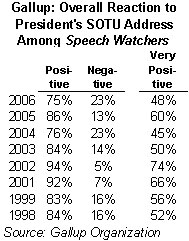dHere is a less than instant reaction to an instant-reaction survey fielded Monday night following the immigration address by President George Bush. CNN conducted the survey (story, results) among Americans who reported viewing the immigration speech by President George Bush. The survey showed 79% of debate speech viewers expressing a positive reaction, only 18% with a negative reaction. This spurred John Podhoretz of the National Review Online (via Kaus) to crow:
Unless this CNN poll was an outlier, last night was anything but undramatic. It was a grand slam for President Bush. You can’t do better than having 79 percent thinking favorably of your speech on a divisive issue, and a 25 percent jump in support for your policies.
Actually, as data on comparable surveys show, this speech was an outlier and you can do better. The survey, conducted by CNN’s new survey partner the Opinion Research Corporation (ORC) appears to use the same basic methodology and an indentical question as used by Gallup in previous speech reaction surveys. Here are the reactions of the speech audience – using precisely the same questions – to the last eight State of the Union addresses:

The positive reaction to the Bush speech (79%) was lower than what President’s Bush and Clinton received in all but two of their last eight SOTU addresses, and the “very positive” (40%) score was lower than all eight. Not surprisingly, the partisanship of the immigration speech audience was heavily Republican – 41% Republican, 23% Democrat – a result in line with the Republican skew of recent Bush SOTU addresses. I wrote about these issues in more depth back in January here, here and here.
Also of note, on Tuesday, the Washington Post‘s Chris Cillizza devoted his Parsing the Polls feature to a discussion of the merits of instant reaction polls. Cillizza gathered comments from Andrew Kohut of the Pew Center, Mike Traugott of the University of Michigan and the Post’s own Claudia Deane. It’s worth a click.
And yes, most of the caution about putting to much faith in instant reactions also applies to our recent obsession with polls on the NSA phone records issues. Keep in mind, however, that a survey of speech watchers can be especially misleading because fans of the President tend to make up a disproportionate share of the audience.
79% of debate viewers
Debate? With himself? Did I miss something?
How legitimate is it to compare a speech like Monday’s (single-issue, etc.) with a more wide-ranging speech like SOTU?
furrier has a good point.
Beside the fact that those most paranoid on the issue were the ones most motivated. Those that think the President and Senate are/were working things in the way they favor-aren’t as motivated to watch.
Those that feel they have the most to lose-are the ones more likely to tune in the address . Remember there is an exception to every rule.
Perhaps the President has been too fast to react to the issues drummed up by bloggers. A funny thing has happened; those that thought that the Dubai port deal was not that big a “threat” and that they weren’t going to “lose” did not call their representatives.
The internet is a relatively new phenomena and people can be driven to a boiling point more persistently and rapidly than even cable televison. Cable has to at least take a breath for commercials, and inflammatory rhetoric is held in check somewhat by the demands of the FCC. Not so the Internet….
Add to that the self selection nature of how “news” can be hunted out on the internet and you may never have to run in to an opposing opinion, and I think adjustments have to be made for that new rapidity in stirring up “contraversies”.